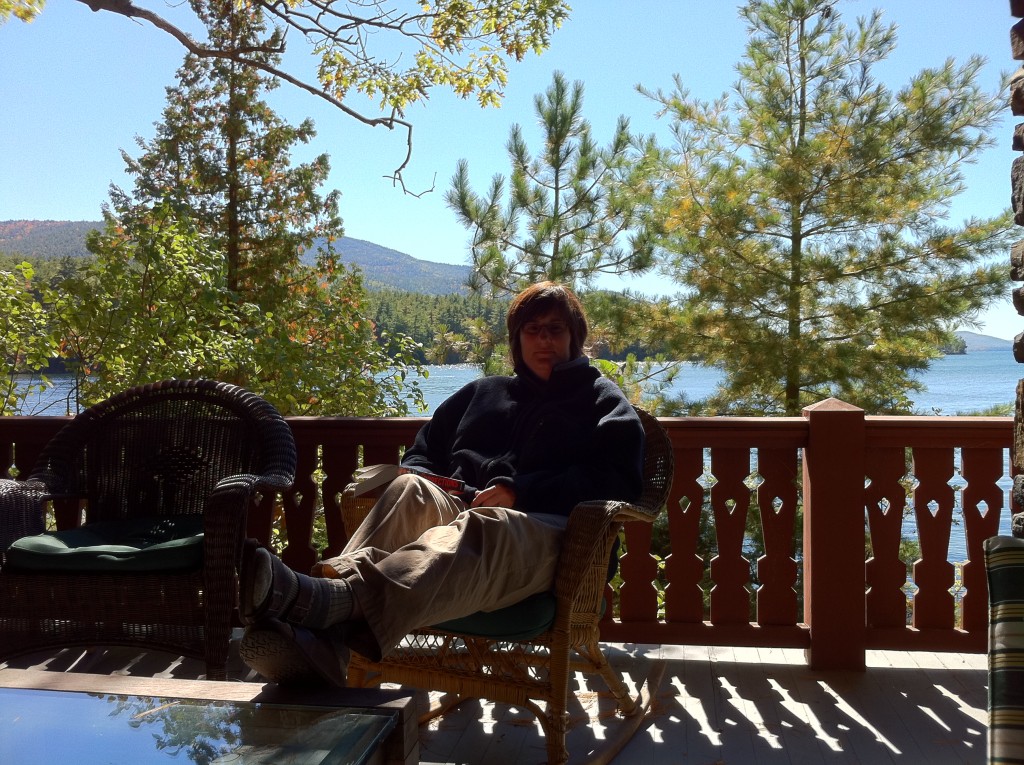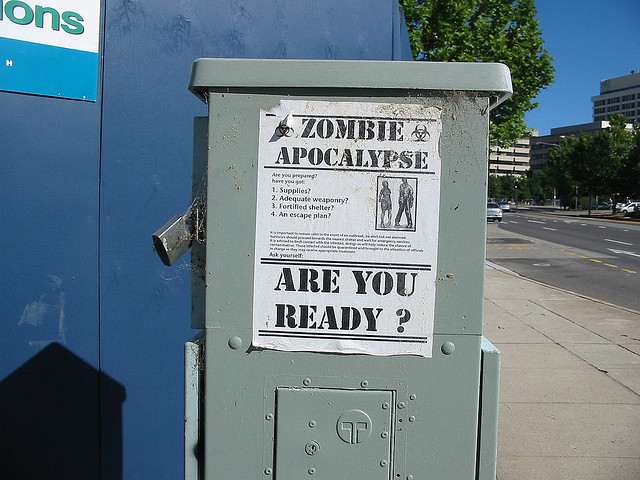
I’m a sucker for a good porch. It’s possible I could write my spiritual autobiography traced through porches I’ve known and loved, from my grandparents’ painted cement slab porch where we ate tomato sandwiches in summer…to the rustic framed Appalachian porch painted with the reminder to “Be still, and know that I am God,” in bold blood red letters hanging over the view…to the wide, wrapping Adirondack refuge of a porch, with nap-assisting furniture and a constant breeze at the lapping edge of the lake… Asked recently for images of God’s grace and presence, I replied in complete honesty, “Porches and Communion.”
So when The Walking Dead decided to pause a while on one of the porch-fronted fancy houses of Alexandria this week during the season’s opening episode, I smiled. [Light spoilers ahead.] They had my attention from the beginning of the scene, where Morgan was perched on the porch steps, tending his walking stick/weapon. This is the first time I can recall any lingering on one of the pretty porches of Alexandria. Mostly folks just stand on them when they are waiting for someone to answer the door.
As Rick and Morgan get reacquainted, Morgan persists in seeing Rick as the man he once knew, back at the start of this whole thing. Rick persists in explaining how he’s not that guy anymore. They’re both a little right and a little wrong. [Early last season, Rick and Tyreese shoveled graves behind the church for their cannibalistic captors, but as this season begins, Rick considers leaving the body of a more recent enemy in the woods to rot. Morgan starts shoveling the grave but Rick doesn’t (until his encounter with the dead man’s son). Are the ethics of The Walking Dead measured by when they stop burying their dead properly?]
In a moment I think they underplayed, Rick offers for Morgan to hold baby Judith. Underplayed, because imagine having been on your own as (we assume) Morgan has been, without any company for all this time, fighting every moment for your life against walkers and the occasional humans with nefarious designs on you. Imagine that as your existence, and then imagine just seeing a baby, much less the wonder and intensity of holding one again. I can’t imagine anyone in that scenario not crying from the relief and hope of that touch. They don’t play it that way but the rest of the scene takes place with Morgan holding one of the most precious and vulnerable parts of Rick’s life.
They’re discussing an incident between Rick and Carter, one of the inexperienced Alexandria men who doesn’t know how to fight and yet doesn’t want to follow Rick’s lead. Rick and Carter just had a showdown where Rick stood over a crumpled Carter, gun pointed at his head, before finally lowering it without shooting. One of the main tensions of the story right now is how unprepared the Alexandrians are for the world as it is now because they haven’t had to fight for survival the way Rick and his crew have. The ethos of Alexandria has been to fortify and stay out of sight, but Rick knows how vulnerable this makes them – and how they don’t even recognize this yet.
Trying to explain his actions and who he is now to Morgan, Rick says, “I wanted to kill him, so it would be easier. So I wouldn’t have to worry about how he could screw up or what stupid thing he’d do next. Because that’s who he is, just somebody who shouldn’t be alive now. I wanted to kill him, but all that hit me and I realized I didn’t have to do it. He doesn’t get it. Somebody like that, they’re going to die no matter what.”
The dumb luck of the naïve and sheltered and the gritty determination and survival skills of experienced fighters amount to the same thing: being alive at this moment. In both groups there are those who shouldn’t be alive, if the world were logical. A defenseless baby, formerly abused women, nerdy super-brains afraid to fight, people who’ve made terrible, hurtful choices, and others who’ve made room for their journeys toward reconciliation and redemption.
That’s how it is with the grace of God, offered lavishly to each of us regardless of merit. None of us deserves to be here or to get a second chance. But here we are, in the midst of an ongoing battle where we are both who we once were and no one like that person anymore. Here we are, out of the jail cell and on the porch, holding something as miraculous as a baby in an apocalypse, and invited to come live inside the house with the family.

